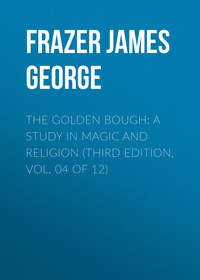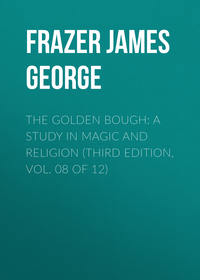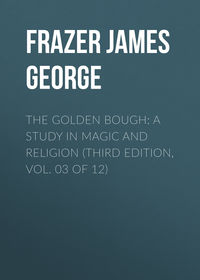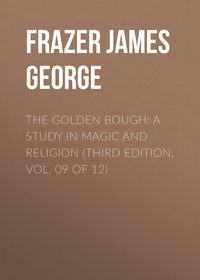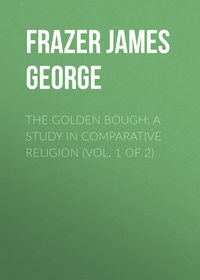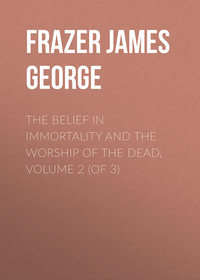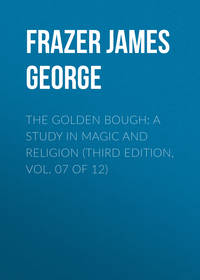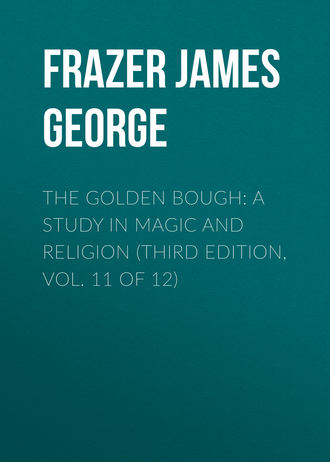 полная версия
полная версияThe Golden Bough: A Study in Magic and Religion (Third Edition, Vol. 11 of 12)
The external soul in Celtic stories. The giant whose soul was in a duck's egg.
The conception of the external soul meets us also in Celtic stories. Thus a tale, told by a blind fiddler in the island of Islay, relates how a giant carried off a king's wife and his two horses and kept them in his den. But the horses attacked the giant and mauled him so that he could hardly crawl. He said to the queen, “If I myself had my soul to keep, those horses would have killed me long ago.” “And where, my dear,” said she, “is thy soul? By the books I will take care of it.” “It is in the Bonnach stone,” said he. So on the morrow when the giant went out, the queen set the Bonnach stone in order exceedingly. In the dusk of the evening the giant came back, and he said to the queen, “What made thee set the Bonnach stone in order like that?” “Because thy soul is in it,” quoth she. “I perceive,” said he, “that if thou didst know where my soul is, thou wouldst give it much respect.” “That I would,” said she. “It is not there,” said he, “my soul is; it is in the threshold.” On the morrow she set the threshold in order finely, and when the giant returned, he asked her, “What brought thee to set the threshold in order like that?” “Because thy soul is in it,” said she. “I perceive,” said he, “that if thou knewest where my soul is, thou wouldst take care of it.” “That I would,” said she. “It is not there that my soul is,” said he. “There is a great flagstone under the threshold. There is a wether under the flag. There is a duck in the wether's belly, and an egg in the belly of the duck, and it is in the egg that my soul is.” On the morrow when the giant was gone, they raised the flagstone and out came the wether. They opened the wether and out came the duck. They split the duck, and out came the egg. And the queen took the egg and crushed it in her hands, and at that very moment the giant, who was coming home in the dusk, fell down dead.370 In another Celtic tale, a sea beast has carried off a king's daughter, and an old smith declares that there is no way of killing the beast but one. “In the island that is in the midst of the loch is Eillid Chaisfhion – the white-footed hind, of the slenderest legs, and the swiftest step, and though she should be caught, there would spring a hoodie out of her, and though the hoodie should be caught, there would spring a trout out of her, but there is an egg in the mouth of the trout, and the soul of the beast is in the egg, and if the egg breaks, the beast is dead.” As usual the egg is broken and the beast dies.371
The herdsman of Cruachan and the helpful animals. The simple giant and the wily woman.
In these Celtic tales the helpful animals reappear and assist the hero in achieving the adventure, though for the sake of brevity I have omitted to describe the parts they play in the plot. They figure also in an Argyleshire story, which seems however to be of Irish origin; for the Cruachan of which we hear in it is not the rugged and lofty mountain Ben Cruachan which towers above the beautiful Loch Awe, but Roscommon Cruachan near Belanagare, the ancient palace of the kings of Connaught, long famous in Irish tradition.372 The story relates how a big giant, King of Sorcha, stole away the wife and the shaggy dun filly of the herdsman or king of Cruachan. So the herdsman baked a bannock to take with him by the way, and set off in quest of his wife and the filly. He went for a long, long time, till at last his soles were blackened and his cheeks were sunken, the yellow-headed birds were going to rest at the roots of the bushes and the tops of the thickets, and the dark clouds of night were coming and the clouds of day were departing; and he saw a house far from him, but though it was far from him he did not take long to reach it. He went in, and sat in the upper end of the house, but there was no one within; and the fire was newly kindled, the house newly swept, and the bed newly made; and who came in but the hawk of Glencuaich, and she said to him, “Are you here, young son of Cruachan?” “I am,” said he. The hawk said to him, “Do you know who was here last night?” “I do not,” said he. “There were here,” said she, “the big giant, King of Sorcha, your wife, and the shaggy dun filly; and the giant was threatening terribly that if he could get hold of you he would take the head off you.” “I well believe it,” said he. Then she gave him food and drink, and sent him to bed. She rose in the morning, made breakfast for him, and baked a bannock for him to take with him on his journey. And he went away and travelled all day, and in the evening he came to another house and went in, and was entertained by the green-headed duck, who told him that the giant had rested there the night before with the wife and shaggy dun filly of the herdsman of Cruachan. And next day the herdsman journeyed again, and at evening he came to another house and went in and was entertained by the fox of the scrubwood, who told him just what the hawk of Glencuaich and the green-headed duck had told him before. Next day the same thing happened, only it was the brown otter of the burn that entertained him at evening in a house where the fire was newly kindled, the floor newly swept, and the bed newly made. And next morning when he awoke, the first thing he saw was the hawk of Glencuaich, the green-headed duck, the fox of the scrubwood, and the brown otter of the burn all dancing together on the floor. They made breakfast for him, and partook of it all together, and said to him, “Should you be at any time in straits, think of us, and we will help you.” Well, that very evening he came to the cave where the giant lived, and who was there before him but his own wife? She gave him food and hid him under clothes at the upper end of the cave. And when the giant came home he sniffed about and said, “The smell of a stranger is in the cave.” But she said no, it was only a little bird she had roasted. “And I wish you would tell me,” said she, “where you keep your life, that I might take good care of it.” “It is in a grey stone over there,” said he. So next day when he went away, she took the grey stone and dressed it well, and placed it in the upper end of the cave. When the giant came home in the evening he said to her, “What is it that you have dressed there?” “Your own life,” said she, “and we must be careful of it.” “I perceive that you are very fond of me, but it is not there,” said he. “Where is it?” said she. “It is in a grey sheep on yonder hillside,” said he. On the morrow, when he went away, she got the grey sheep, dressed it well, and placed it in the upper end of the cave. When he came home in the evening he said, “What is it that you have dressed there?” “Your own life, my love,” said she. “It is not there as yet,” said he. “Well!” said she, “you are putting me to great trouble taking care of it, and you have not told me the truth these two times.” He then said, “I think that I may tell it to you now. My life is below the feet of the big horse in the stable. There is a place down there in which there is a small lake. Over the lake are seven grey hides, and over the hides are seven sods from the heath, and under all these are seven oak planks. There is a trout in the lake, and a duck in the belly of the trout, an egg in the belly of the duck, and a thorn of blackthorn inside of the egg, and till that thorn is chewed small I cannot be killed. Whenever the seven grey hides, the seven sods from the heath, and the seven oak planks are touched I shall feel it wherever I shall be. I have an axe above the door, and unless all these are cut through with one blow of it the lake will not be reached; and when it will be reached I shall feel it.” Next day, when the giant had gone out hunting on the hill, the herdsman of Cruachan contrived, with the help of the friendly animals – the hawk, the duck, the fox, and the otter – to get possession of the fateful thorn and to chew it before the giant could reach him; and no sooner had he done so than the giant dropped stark and stiff, a corpse.373
Argyleshire story of the Bare-Stripping Hangman whose soul was in a duck's egg.
Another Argyleshire story relates how a certain giant, who lived in the Black Corrie of Ben Breck, carried off three daughters of a king, one after the other, at intervals of seven years. The bereaved monarch sent champions to rescue his lost daughters, but though they surprised the giant in his sleep and cut off his head, it was all to no purpose; for as fast as they cut it off he put it on again and made after them as if nothing had happened. So the champions fled away before him as fast as they could lay legs to the ground, and the more agile of them escaped, but the shorter-winded he caught, bared them to the skin, and hanged them on hooks against the turrets of his castle. So he went by the name of the Bare-Stripping Hangman. Now this amiable man had announced his intention of coming to fetch away the fourth and last of the king's daughters, when another seven years should be up. The time was drawing near, and the king, with the natural instincts of a father, was in great tribulation, when as good luck would have it a son of the king of Ireland, by name Alastir, arrived in the king's castle and undertook to find out where the Bare-Stripping Hangman had hidden his soul. To cut a long story short, the artful Hangman had hidden his soul in an egg, which was in the belly of a duck, which was in the belly of a salmon, which was in the belly of a swift-footed hind of the cliffs. The prince wormed the secret from a little old man, and by the help of a dog, a brown otter, and a falcon he contrived to extract the egg from its various envelopes and crushed it to bits between his hands and knees. So when he came to the giant's castle he found the Bare-Stripping Hangman lying dead on the floor.374
Highland story of Headless Hugh.
Another Highland story sets forth how Hugh, prince of Lochlin, was long held captive by a giant who lived in a cave overlooking the Sound of Mull. At last, after he had spent many years of captivity in that dismal cave, it came to pass that one night the giant and his wife had a great dispute, and Hugh overheard their talk, and learned that the giant's soul was in a precious gem which he always wore on his forehead. So the prince watched his opportunity, seized the gem, and having no means of escape or concealment, hastily swallowed it. Like lightning from the clouds, the giant's sword flashed from its scabbard and flew between Hugh's head and his body to intercept the gem before it could descend into the prince's stomach. But it was too late; and the giant fell down, sword in hand, and expired without a gasp. Hugh had now lost his head, it is true, but having the giant's soul in his body he felt none the worse for the accident. So he buckled the giant's sword at his side, mounted the grey filly, swifter than the east wind, that never had a bridle, and rode home. But the want of his head made a painful impression on his friends; indeed they maintained that he was a ghost and shut the door in his face, so now he wanders for ever in shades of darkness, riding the grey filly fleeter than the wind. On stormy nights, when the wind howls about the gables and among the trees, you may see him galloping along the shore of the sea “between wave and sand.” Many a naughty little boy, who would not go quietly to bed, has been carried off by Headless Hugh on his grey filly and never seen again.375
The Mackays the descendants of the seal.
In Sutherlandshire at the present day there is a sept of Mackays known as “the descendants of the seal,” who claim to be sprung from a mermaid, and the story they tell in explanation of their claim involves the notion of the external soul. They say that the laird of Borgie used to go down to the rocks under his castle to bathe. One day he saw a mermaid close in shore, combing her hair and swimming about, as if she were anxious to land. After watching her for a time, he noticed her cowl on the rocks beside him, and knowing that she could not go to sea without it, he carried the cowl up to the castle in the hope that she would follow him. She did so, but he refused to give up the cowl and detained the sea-maiden herself and made her his wife. To this she consented with great reluctance, and told him that her life was bound up with the cowl, and that if it rotted or was destroyed she would instantly die. So the cowl was placed for safety in the middle of a great hay-stack, and there it lay for years. One unhappy day, when the laird was from home, the servants were working among the hay and found the cowl. Not knowing what it was, they shewed it to the lady of the house. The sight revived memories of her old life in the depths of the sea, so she took the cowl, and leaving her child in its cot, plunged into the sea and never came home to Borgie any more. Only sometimes she would swim close in shore to see her boy, and then she wept because he was not of her own kind that she might take him to sea with her. The boy grew to be a man, and his descendants are famous swimmers. They cannot drown, and to this day they are known in the neighbourhood as Sliochd an roin, that is, “the descendants of the seal.”376
The external soul in Irish and Breton stories. The giant and the egg. The helpful animals. Body-without-Soul. The helpful animals. The giant whose life was in a box-tree.
In an Irish story we read how a giant kept a beautiful damsel a prisoner in his castle on the top of a hill, which was white with the bones of the champions who had tried in vain to rescue the fair captive. At last the hero, after hewing and slashing at the giant all to no purpose, discovered that the only way to kill him was to rub a mole on the giant's right breast with a certain egg, which was in a duck, which was in a chest, which lay locked and bound at the bottom of the sea. With the help of some obliging salmon, rams, and eagles, the hero as usual made himself master of the precious egg and slew the giant by merely striking it against the mole on his right breast.377 Similarly in a Breton story there figures a giant whom neither fire nor water nor steel can harm. He tells his seventh wife, whom he has just married after murdering all her predecessors, “I am immortal, and no one can hurt me unless he crushes on my breast an egg, which is in a pigeon, which is in the belly of a hare; this hare is in the belly of a wolf, and this wolf is in the belly of my brother, who dwells a thousand leagues from here. So I am quite easy on that score.” A soldier, the hero of the tale, had been of service to an ant, a wolf, and a sea-bird, who in return bestowed on him the power of turning himself into an ant, a wolf, or a sea-bird at will. By means of this magical power the soldier contrived to obtain the egg and crush it on the breast of the giant, who immediately expired.378 Another Breton story tells of a giant who was called Body-without-Soul because his life did not reside in his body. He himself dwelt in a beautiful castle which hung between heaven and earth, suspended by four golden chains; but his life was in an egg, and the egg was in a dove, and the dove was in a hare, and the hare was in a wolf, and the wolf was in an iron chest at the bottom of the sea. In his castle in the air he kept prisoner a beauteous princess whom he had swooped down upon and carried off in a magic chariot. But her lover turned himself into an ant and so climbed up one of the golden chains into the enchanted castle, for he had done a kindness to the king and queen of ants, and they rewarded him by transforming him into an ant in his time of need. When he had learned from the captive princess the secret of the giant's life, he procured the chest from the bottom of the sea by the help of the king of fishes, whom he had also obliged; and opening the chest he killed first the wolf, then the hare, and then the dove, and at the death of each animal the giant grew weaker and weaker as if he had lost a limb. In the stomach of the dove the hero found the egg on which the giant's life depended, and when he came with it to the castle he found Body-without-Soul stretched on his bed at the point of death. So he dashed the egg against the giant's forehead, the egg broke, and the giant straightway expired.379 In another Breton tale the life of a giant resides in an old box-tree which grows in his castle garden; and to kill him it is necessary to sever the tap-root of the tree at a single blow of an axe without injuring any of the lesser roots. This task the hero, as usual, successfully accomplishes, and at the same moment the giant drops dead.380
The external soul in stories of non-Aryan peoples. The ancient Egyptian story of the Two Brothers. The heart in the flower of the Acacia.
The notion of an external soul has now been traced in folk-tales told by Aryan peoples from India to Brittany and the Hebrides. We have still to shew that the same idea occurs commonly in the popular stories of peoples who do not belong to the Aryan stock. In the first place it appears in the ancient Egyptian story of “The Two Brothers.” This story was written down in the reign of Rameses II., about 1300 b. c. It is therefore older than our present redaction of Homer, and far older than the Bible. The outline of the story, so far as it concerns us here, is as follows. Once upon a time there were two brethren; the name of the elder was Anpu and the name of the younger was Bata. Now Anpu had a house and a wife, and his younger brother dwelt with him as his servant. It was Anpu who made the garments, and every morning when it grew light he drove the kine afield. As he walked behind them they used to say to him, “The grass is good in such and such a place,” and he heard what they said and led them to the good pasture that they desired. So his kine grew very sleek and multiplied greatly. One day when the two brothers were at work in the field the elder brother said to the younger, “Run and fetch seed from the village.” So the younger brother ran and said to the wife of his elder brother, “Give me seed that I may run to the field, for my brother sent me saying, Tarry not.” She said, “Go to the barn and take as much as thou wouldst.” He went and filled a jar full of wheat and barley, and came forth bearing it on his shoulders. When the woman saw him her heart went out to him, and she laid hold of him and said, “Come, let us rest an hour together.” But he said, “Thou art to me as a mother, and my brother is to me as a father.” So he would not hearken to her, but took the load on his back and went away to the field. In the evening, when the elder brother was returning from the field, his wife feared for what she had said. So she took soot and made herself as one who had been beaten. And when her husband came home, she said, “When thy younger brother came to fetch seed, he said to me, Come, let us rest an hour together. But I would not, and he beat me.” Then the elder brother became like a panther of the south; he sharpened his knife and stood behind the door of the cow-house. And when the sun set and the younger brother came laden with all the herbs of the field, as was his wont every day, the cow that walked in front of the herd said to him, “Behold, thine elder brother stands with a knife to kill thee. Flee before him.” When he heard what the cow said, he looked under the door of the cow-house and saw the feet of his elder brother standing behind the door, his knife in his hand. So he fled and his brother pursued him with the knife. But the younger brother cried for help to the Sun, and the Sun heard him and caused a great water to spring up between him and his elder brother, and the water was full of crocodiles. The two brothers stood, the one on the one side of the water and the other on the other, and the younger brother told the elder brother all that had befallen. So the elder brother repented him of what he had done and he lifted up his voice and wept. But he could not come at the farther bank by reason of the crocodiles. His younger brother called to him and said, “Go home and tend the cattle thyself. For I will dwell no more in the place where thou art. I will go to the Valley of the Acacia. But this is what thou shalt do for me. Thou shalt come and care for me, if evil befalls me, for I will enchant my heart and place it on the top of the flower of the Acacia; and if they cut the Acacia and my heart falls to the ground, thou shalt come and seek it, and when thou hast found it thou shalt lay it in a vessel of fresh water. Then I shall come to life again. But this is the sign that evil has befallen me; the pot of beer in thine hand shall bubble.” So he went away to the Valley of the Acacia, but his brother returned home with dust on his head and slew his wife and cast her to the dogs.
Bata in the Valley of the Acacia. How Bata died and was brought to life again.
For many days afterwards the younger brother dwelt alone in the Valley of the Acacia. By day he hunted the beasts of the field, but at evening he came and laid him down under the Acacia, on the top of whose flower was his heart. And many days after that he built himself a house in the Valley of the Acacia. But the gods were grieved for him; and the Sun said to Khnumu, “Make a wife for Bata, that he may not dwell alone.” So Khnumu made him a woman to dwell with him, who was perfect in her limbs more than any woman on earth, for all the gods were in her. So she dwelt with him. But one day a lock of her hair fell into the river and floated down to the land of Egypt, to the house of Pharaoh's washerwomen. The fragrance of the lock perfumed Pharaoh's raiment, and the washerwomen were blamed, for it was said, “An odour of perfume in the garments of Pharaoh!” So the heart of Pharaoh's chief washerman was weary of the complaints that were made every day, and he went to the wharf, and there in the water he spied the lock of hair. He sent one down into the river to fetch it, and, because it smelt sweetly, he took it to Pharaoh. Then Pharaoh's magicians were sent for and they said, “This lock of hair belongs to a daughter of the Sun, who has in her the essence of all the gods. Let messengers go forth to all foreign lands to seek her.” So the woman was brought from the Valley of the Acacia with chariots and archers and much people, and all the land of Egypt rejoiced at her coming, and Pharaoh loved her. But when they asked her of her husband, she said to Pharaoh, “Let them cut down the Acacia and let them destroy it.” So men were sent with tools to cut down the Acacia. They came to it and cut the flower upon which was the heart of Bata; and he fell down dead in that evil hour. But the next day, when the earth grew light and the elder brother of Bata was entered into his house and had sat down, they brought him a pot of beer and it bubbled, and they gave him a jug of wine and it grew turbid. Then he took his staff and his sandals and hied him to the Valley of the Acacia, and there he found his younger brother lying dead in his house. So he sought for the heart of his brother under the Acacia. For three years he sought in vain, but in the fourth year he found it in the berry of the Acacia. So he threw the heart into a cup of fresh water. And when it was night and the heart had sucked in much water, Bata shook in all his limbs and revived. Then he drank the cup of water in which his heart was, and his heart went into its place, and he lived as before.381
The external soul in Arabian stories. The jinnee and the sparrow. The ogress and the bottle.
In the Arabian Nights we read how Seyf el-Mulook, after wandering for four months over mountains and hills and deserts, came to a lofty palace in which he found the lovely daughter of the King of India sitting alone on a golden couch in a hall spread with silken carpets. She tells him that she is held captive by a jinnee, who had swooped down on her and carried her off while she was disporting herself with her female slaves in a tank in the great garden of her father the king. Seyf el-Mulook then offers to smite the jinnee with the sword and slay him. “But,” she replied, “thou canst not slay him unless thou kill his soul.” “And in what place,” said he, “is his soul?” She answered, “I asked him respecting it many times; but he would not confess to me its place. It happened, however, that I urged him, one day, and he was enraged against me, and said to me, ‘How often wilt thou ask me respecting my soul? What is the reason of thy question respecting my soul?’ So I answered him, ‘O Hátim, there remaineth to me no one but thee, excepting God; and I, as long as I live, would not cease to hold thy soul in my embrace; and if I do not take care of thy soul, and put it in the midst of my eye, how can I live after thee? If I knew thy soul, I would take care of it as of my right eye.’ And thereupon he said to me, ‘When I was born, the astrologers declared that the destruction of my soul would be effected by the hand of one of the sons of the human kings. I therefore took my soul, and put it into the crop of a sparrow, and I imprisoned the sparrow in a little box, and put this into another small box, and this I put within seven other small boxes, and I put these within seven chests, and the chests I put into a coffer of marble within the verge of this circumambient ocean; for this part is remote from the countries of mankind, and none of mankind can gain access to it.’ ” But Seyf el-Mulook got possession of the sparrow and strangled it, and the jinnee fell upon the ground a heap of black ashes.382 In a modern Arabian tale a king marries an ogress, who puts out the eyes of the king's forty wives. One of the blinded queens gives birth to a son whom she names Mohammed the Prudent. But the ogress queen hated him and compassed his death. So she sent him on an errand to the house of her kinsfolk the ogres. In the house of the ogres he saw some things hanging from the roof, and on asking a female slave what they were, she said, “That is the bottle which contains the life of my lady the queen, and the other bottle beside it contains the eyes of the queens whom my mistress blinded.” A little afterwards he spied a beetle and rose to kill it. “Don't kill it,” cried the slave, “for that is my life.” But Mohammed the Prudent watched the beetle till it entered a chink in the wall; and when the female slave had fallen asleep, he killed the beetle in its hole, and so the slave died. Then Mohammed took down the two bottles and carried them home to his father's palace. There he presented himself before the ogress queen and said, “See, I have your life in my hand, but I will not kill you till you have replaced the eyes which you took from the forty queens.” The ogress did as she was bid, and then Mohammed the Prudent said, “There, take your life.” But the bottle slipped from his hand and fell, the life of the ogress escaped from it, and she died.383


